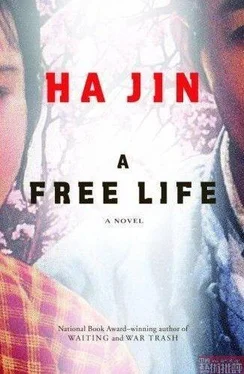The Wus had noticed the junk cars, the oil drums, and the piles of firewood and plastic pipes in Gerald's backyard, in the middle of which sat a large trampoline. Toward the lakeside all the trees were entwined by vines, almost blocking the view of the water and giving a swampy impression. One pine had fallen into the lake; against its root leaned an overturned canoe, which Gerald had never rowed. Goby, the kinky-coated collie Gerald kept, was tethered to a fence post by a long chain all the time, and his doghouse looked like a chicken coop. Gerald never walked him, and the confinement seemed to have maddened the dog, who often gasped and coughed. Goby had angry eyes and yowled a lot, sometimes furiously in the dead of night, triggering the crescendo of baying as about a dozen dogs at the houses around the lake joined in. From the day the Wus moved here, Goby would growl and woof at them, even though Tao-tao tried to appease him with scraps of food over and over again. Once Pingping saw a white man enter Gerald's backyard to read the water meter, and the dog made no noise whatsoever. Indeed, Goby wouldn't bark at Caucasians, neither neighbors nor strangers. "That dog is racist," Pingping said. Both Nan and Taotao agreed.
The Wus weren't really bothered by the messy state of Gerald's home, and they didn't intend to talk with him as Alan had urged them to do. Instead, they felt sorry for him and decided not to pressure him like the other neighbors. Similar to Gerald, they viewed themselves as poor people.
Nan now understood why Mr. Wolfe had smiled secretively when Pingping handed him the check-the old man must have believed nobody would want to live with a neighbor like Gerald, whose wretched house would make the adjacent homes depreciate in value. The Wus didn't mind having such a neighbor, since they wouldn't be selling their house anytime soon. Their only regret was that, had they mentioned Gerald's house in the negotiation, they could have haggled down the price considerably with Mr. Wolfe.
IT SNOWED on Saturday night a month after they had settled into their new home. This was rare in Georgia. The three-inch snow on the ground excited the children in the neighborhood, some of whom came out the next morning, riding on makeshift sleds, frolicking on the white lawns, and throwing snowballs while shouting war cries. Owing to the weight of crusted ice, some branches, especially of pines, had snapped and fallen to the ground. Electrical wires were mangled here and there, and workers were busy repairing them. The din raised by chain saws came from everywhere. In the Wus' backyard icicles still hung on the sweet gums at the waterside, having expanded and thickened the shadows cast by the trees on the lake. The waterfowl were all out of view and nestled in the bushes on the other shore to keep warm. From time to time they let out lethargic cries.
Taotao, accustomed to being alone, didn't join the kids of the neighborhood and instead played with his mother on their own lawn. Through the sliding glass door Nan watched his wife and son in the backyard; both of them were in the winter gear they had worn in the Northeast-leather gloves and tall boots. Pingping donned a flesh-colored stocking hat and a quilted coat that came down to her calves. Taotao wore a blue parka. Together mother and son were pushing a snowball already two feet across, while their breath clouded before them. The boy wanted to save some snow, so they were rolling the snowball around. Observing them, Nan was moved by the tranquil sight. His wife and son looked so happy and intimate. Suddenly Pingping took a pratfall, having stepped on one of the terrazzo tiles set a yard apart to form a curved path toward the lakeside. Taotao broke out laughing and clapped his gloved hands while his mother picked herself up from the ice-crusted grass. Nan chuckled over his tea mug.
Although touched by the peaceful scene, he still felt a lingering pain in his heart. The previous night he had again dreamed of his first love, Beina. In his sleep the two of them walked outside the campus of their old college. Moonlight filtered through the aspen grove and was shimmering on the snow grayed by thawing. For some reason, they quarreled again, and angrily she hurried away to the entrance of her dorm building. He shouted, "Beina, Beina, wait a second, let me explain!" She wouldn't listen and faded into the darkness of the doorway. His friend Danning appeared from behind a thick birch and dragged him away, saying, "She's not worth your love. Forget her. My friend, you must save yourself!" Somehow later Beina embraced him at a train station and wept wretchedly. After he woke up, he mused about her tears but couldn't guess why. He hoped her husband hadn't treated her too badly. She had looked colorless and must have been ill. Why had Danning Meng, the man who had studied physics at Brandeis and returned to Beijing two years ago, appeared in his dream? Nan was positive that Danning and Beina hadn't known each other at all. What a bizarre dream.
Peals of laughter came from outside and brought Nan back to his wife and son. He went on observing them, happy to see them in such buoyant spirits. He had just finished reading A House for Mr. Biswas and still vividly remembered the struggle the protagonist waged for having his own shelter in his own corner of land. He felt fortunate that he might achieve such a goal in just a few years. Though their mortgage was unpaid, he was on his way to becoming an independent man. His heart was filled with joy and gratitude. At long last he was hungry for making money, a lot of money, so that his family could live in peace and security.
With the back of his hand he touched his face, which wasn't hot today. Ever since the outset of the winter, he had often run a low fever. He had lived in cold climates all his life, and now in the mild Georgia winter his body was ready to resist cold, of which there wasn't any. Small wonder, bugs abounded here in the summertime. Any insects could easily survive a mild winter like this. Nan had noticed that a lot of roaches hibernated in the firewood left by Mr. Wolfe, stacked along their western steel fence. Just now as he talked with Gerald, Gerald had told him, "This snow's killing all them bugs. There'll be a bumpa peach crop nex' summa." If only there were more cold days like this one.
On such a crisp morning Nan felt energetic and clearheaded. He was in the mood for writing a poem about the scene in the backyard, about the joy and serenity of life, but he couldn't decide how to begin. He thought a good while about such a poem, which should start with a line like this: "Snow has been falling in the Southeast," but he didn't know how to proceed from there. In an hour or so he'd have to go to the restaurant, where there were chickens to cut up, flounder to clean, and spring rolls to wrap. It was always busy on Sundays, and he had to get everything ready before noon, the opening time. So he returned to his room and lay down on his bed to rest some more before setting out for work.
NOWADAYS Taotao no longer stayed at the restaurant after school. Their house was so close by that he could walk back and forth. If he was at home alone, Pingping would call to check on him. Sometimes she'd go back to see if he was doing his homework. Nan had bought him a cheap computer because Taotao said he would build one by himself eventually. The boy knew two older kids who had just assembled their own computers, and his parents agreed to buy the parts for him. Both Nan and his wife felt fortunate about the way things had worked out. They were eager to get rid of their debt, though Pingping insisted on keeping a tidy sum in the bank as a backup fund. The economy was still in recession despite the start of a slow recovery. She wanted to make certain that they could have enough money for the monthly payment even in a lean time. On average they managed to pay Mr. Wolfe $1,500 a month.
Читать дальше












